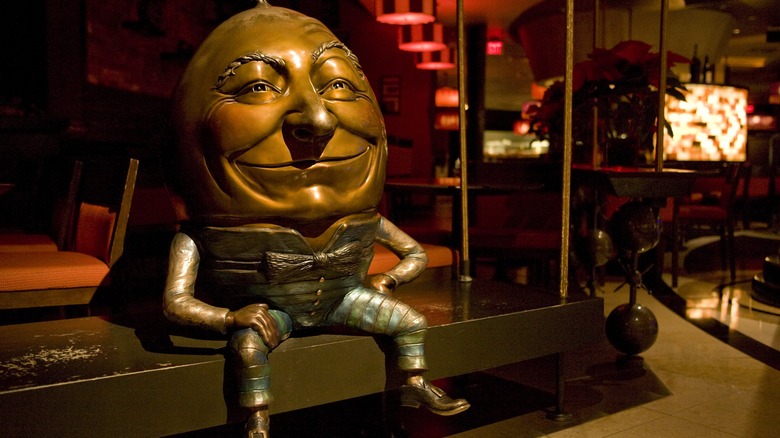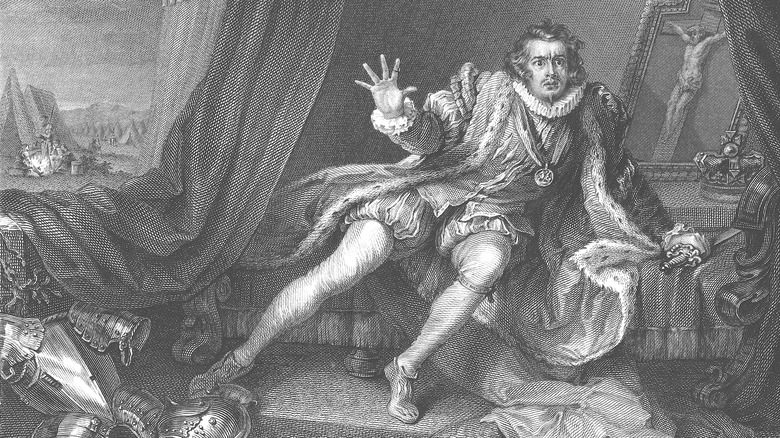The Origins Behind Humpty Dumpty Aren't What You'd Expect
Hey kids, you want to chant a little nursery rhyme together? It's about this egg man who sits on a stone wall and falls down and breaks into pieces. Does he die? No clue. Was he ever alive? No clue. Did his yolk burst out and blub itself into the soil along with his organs and blood? No clue. But some soldiers try to reassemble the shattered egg man and can't. The end. Yay! Now let's sing about an old guy who bumps his head while snoring and dies of an aneurysm or something.
Seriously, has anyone ever listened to the words of certain children's rhymes or songs? "London Bridge is Falling Down" is either about a Viking assault or a medieval torture room. "Ring Around the Rosie" might be about an outbreak of plague, while some suggest "Mary, Mary Quite Contrary" is about torturing Protestants. "Humpty Dumpty" might not be as dark as these or come with a cute melody, but its true meaning is definitely nothing you'd expect.
As The Vintage News says, many take "Humpty Dumpty" as a description of King Richard III (1483 to 1485 C.E.), a short-lived, often-derided English monarch immortalized by Shakespeare as a hunchbacked, vile villain in his play "Richard III" (1592/3). This is only one interpretation, however, and no one really knows for sure what Humpty Dumpty means.
The broken tyrant king
Just in case folks need a reminder, here's Humpty Dumpty's four lines from Poetry Foundation: "Humpty Dumpty sat on a wall / Humpty Dumpty had a great fall / All the king's horses and all the king's men / Couldn't put Humpty together again." That version comes from 1902's "Denslow's Mother Goose," complete with a memorable picture of an egg man on a wall. The original had a different third line, per Vintage News: "Four-score men and four-score more." That original version first appeared in print in 1797's "Juvenile Amusement" songbook by Samuel Arnold.
Vintage News follows the reasoning if we take Humpty Dumpty to be King Richard III. Back in 1485, Richard III was killed in combat at the Battle of Bosworth, which ended England's 30-year-long War of the Roses between competing families seeking the English throne. Richard fell off his horse, broken-bodied, and couldn't be put back together again — simple as that. One hundred years later, Shakespeare ripped him a poetic new one in "Richard III" and excoriated him as a power-grubbing lunatic and child-and-wife killing tyrant. Two hundred years after that we get Humpty Dumpty.
In the centuries since, Richard has continued to come up in cultural and academic circles, often painted as an underdog unfairly bullied by the bard, as stories on NPR and History Skills depict. At minimum, he's a prominent enough fit when wondering about any secret Humpty Dumpty messaging.
Digging into alternatives
Before we get into alternative, non-monarchical interpretations, the reader should bear in mind: Sometimes writers just like how things sound. Samuel Arnold might have just rolled with a weird image and word rhythm that wormed its way into his brain. If so, then the joke's on us for applying logical rigor to a babyishly simple quatrain and insisting on some grand, deeper meaning connected to narratives of ancient kings. Or narratives of buffoons, alcohol, or cannons.
In 1785's "Classical Dictionary of the Vulgar Tongue," Humpty Dumpty is English slang for "a short clumsey person of either sex, also ale boiled with brandy." Twelve years later Samuel Arnold released 1797's "Juvenile Amusement." Coincidence? Well, about 80 years after that in 1871 the brilliantly imaginative Lewis Carrol interpreted Humpty Dumpty as a literal walking-talking egg man in "Through the Looking Glass" — Alice and Humpty are even on the book's cover. And as mentioned, the poem's "four-score men and four-score more" line wasn't swapped out for "all the king's horses and all the king's men" until 30 years later in 1902. Did anyone connect Humpty to Richard III before then? Who knows.
And finally, Ripley's talks about how Humpty might even be a cannon stationed along the wall of the English parliament during the English Civil Wars (1642 to 1651). And because why not, American Songwriter also mentions that Humpty might be one of two animals for some reason: a cardinal or a tortoise.


